Hobbs: US History Unit 5 Review
5.0(1)
5.0(1)
Card Sorting
1/52
Earn XP
Description and Tags
Study Analytics
Name | Mastery | Learn | Test | Matching | Spaced |
|---|
No study sessions yet.
53 Terms
1
New cards
Abraham Lincoln
- Free Soil
- Whig→Republican
- Captain in the black hop war
- Emancipation proclamation which paved the way for the slavery's abolition
- Whig→Republican
- Captain in the black hop war
- Emancipation proclamation which paved the way for the slavery's abolition
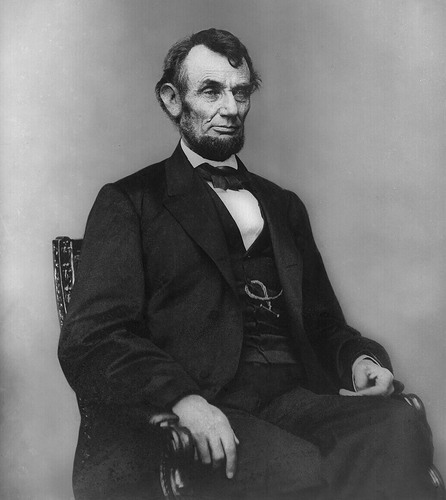
2
New cards
Alexis de Tocqueville
- French philosopher and aristocrat
- Author of Democracy in America
- Author of Democracy in America

3
New cards
Andrew Jackson
- Led the Battle of New Orleans
- "Drain the swamp"
- "Turn the rascals out"
- "So you see the Judas of the west has closed the contract and will receive the thirty pieces of silver. His end will be the same."
- Blamed JQA's people for Rachel's death
- "Drain the swamp"
- "Turn the rascals out"
- "So you see the Judas of the west has closed the contract and will receive the thirty pieces of silver. His end will be the same."
- Blamed JQA's people for Rachel's death
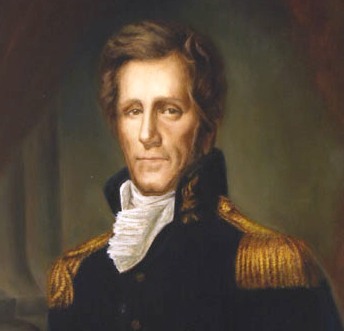
4
New cards
James Monroe
- His presidency is known as the era of good feelings
- Appointed men of different political viewpoints to places in the government
- John Calhoun and John Quincy Adams
- Appointed men of different political viewpoints to places in the government
- John Calhoun and John Quincy Adams
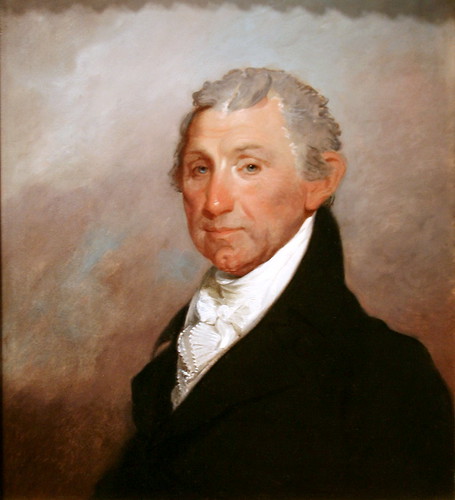
5
New cards
James Madison
- War of 1812
- Created the Second National Bank
- Started the Era of Good Feelings
- Created the Second National Bank
- Started the Era of Good Feelings
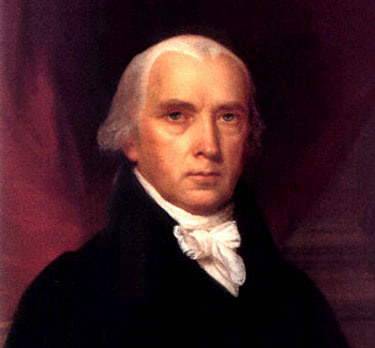
6
New cards
John Brown
- An abolitionist who attempted to lead a slave revolt by capturing Armories in southern territory and giving weapons to slaves, was hung in Harpers Ferry after capturing an Armory
- Pottawatomie Creek- executed 5 men with axe and scythe in protest to Slavery
- Pottawatomie Creek- executed 5 men with axe and scythe in protest to Slavery
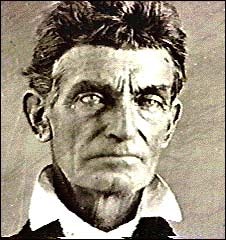
7
New cards
John Quincy Adams
- Monroe Doctrine author
- Secretary of state under Monroe
- Boston MA
- Corrupt bargain
- Secretary of state under Monroe
- Boston MA
- Corrupt bargain
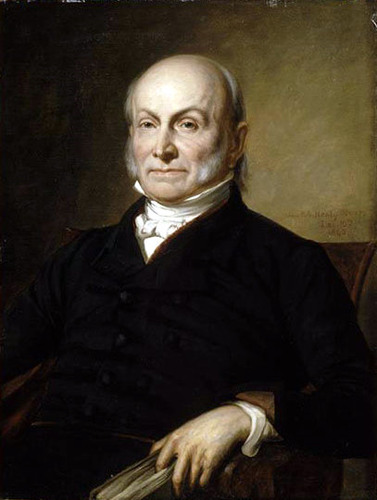
8
New cards
Stephen Douglas
- Senator from Illinois
- Wanted Westward Expansion
- Proposed the compromise of 1850
- Helped decide where the transcontinental railroad would start(Starting in Illinois going through Nebraska Territory)
- Proposed the 36'30 to be repealed and have popular sovereignty instead (kansas and nebraska act)
- The North of the Nebraska territory is Nebraska and the South is Kansas
- Wanted Westward Expansion
- Proposed the compromise of 1850
- Helped decide where the transcontinental railroad would start(Starting in Illinois going through Nebraska Territory)
- Proposed the 36'30 to be repealed and have popular sovereignty instead (kansas and nebraska act)
- The North of the Nebraska territory is Nebraska and the South is Kansas
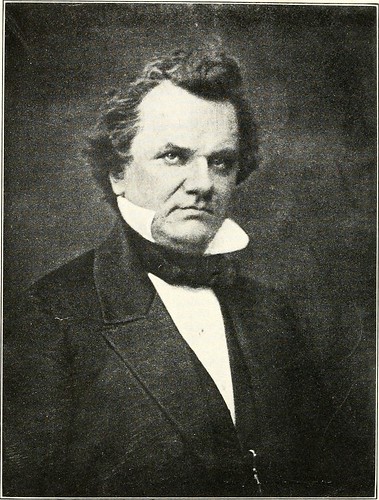
9
New cards
Winfield Scott
- Fought in the Mexican War and won
- Head of WestPoint
- Led his attack in the same way Cortes did to the Aztecs
- Head of WestPoint
- Led his attack in the same way Cortes did to the Aztecs
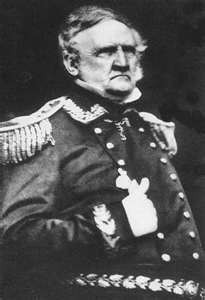
10
New cards
Zachary Taylor
- A part of the Whig party
- Lead the Thornton Affair (April 1846)
- Died because of the cherries he ate
- Lead the Thornton Affair (April 1846)
- Died because of the cherries he ate
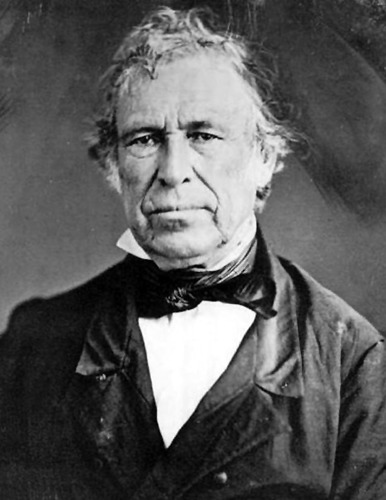
11
New cards
Thornton Affair
- Polk baited the Mexicans to attack an army on the Rio Grande, when they did he used it to justify the Mexican War
12
New cards
Mississippi as a slave
Indiana as a free
13
New cards
Alabama as a slave
Illinois as a free
14
New cards
Missouri as a slave
Maine as a free
15
New cards
Arkansas as a slave
Michigan as a free
16
New cards
"The Crime of Kansas"
- Bloodletting of votes
- Border Ruffians
- Compared Kansas to a rape of a virgin
- Written by charles sumner and he accused Andrew Butler of raping this girl then Butler's nephew attacked sumner
- Border Ruffians
- Compared Kansas to a rape of a virgin
- Written by charles sumner and he accused Andrew Butler of raping this girl then Butler's nephew attacked sumner
17
New cards
Battle of Chapultapec
- Decisive battle of the war
- Winfield took Mexico City in the same manner as Cortez took the Aztecs
- Lead to the treaty of guadalupe hidalgo
- Winfield took Mexico City in the same manner as Cortez took the Aztecs
- Lead to the treaty of guadalupe hidalgo
18
New cards
Battle of New Orleans
- A battle during the War of 1812 where the British army attempted to take New Orleans. - Due to the foolish frontal attack, Jackson defeated them, which gave him an enormous popularity boost.
19
New cards
Bear Flag Republic
- California Revolution
- Took 2 days for the Californians to take over from Spain, the republic lasted 9 days
- Took 2 days for the Californians to take over from Spain, the republic lasted 9 days
20
New cards
Beecher's bibles
- During the Kansas border war, the New England Emigrant Aid Society sent rifles at the instigation of fervid abolitionists like the preacher Henry Beecher. These rifles became known as _______________.
21
New cards
Border Ruffians
- Missourians and Southern folk who traveled in armed groups to vote in Kansas's election during the mid-1850's
22
New cards
Compromise of 1850
- (1) California admitted as free state
- (2) territorial status and popular sovereignty of Utah and New Mexico,
- (3) resolution of Texas-New Mexico boundaries,
- (4) federal assumption of Texas debt,
- (5) slave trade abolished in DC, and
- (6) new fugitive slave law
- Advocated by Henry Clay and Stephen A. Douglas
- (2) territorial status and popular sovereignty of Utah and New Mexico,
- (3) resolution of Texas-New Mexico boundaries,
- (4) federal assumption of Texas debt,
- (5) slave trade abolished in DC, and
- (6) new fugitive slave law
- Advocated by Henry Clay and Stephen A. Douglas
23
New cards
Democracy in America
- Classic French text by Alexis de Tocqueville on the United States in the 1830s and its strengths and weaknesses such as the tyranny of the majority
- Explained why republicanism succeeded in the U.S. and failed elsewhere.
- Explained why republicanism succeeded in the U.S. and failed elsewhere.
24
New cards
Election of 1824
- No one won a majority of electoral votes, so the House of Representatives had to decide among Adams, Jackson, and Clay. - Clay dropped out and urged his supporters in the House to throw their votes behind Adams
- `Jackson and his followers were furious and accused Adams and Clay of a "corrupt bargain."
- `Jackson and his followers were furious and accused Adams and Clay of a "corrupt bargain."
25
New cards
Erie Canal
- A canal between the New York cities of Albany and Buffalo, completed in 1825. - The canal, considered a marvel of the modern world at the time, allowed western farmers to ship surplus crops to sell in the North and allowed northern manufacturers to ship finished goods to sell in the West.
26
New cards
Free Soil
- The belief that slavery must be kept out of the Western territories, for the sake of preserving Northern free labor.
27
New cards
Indian Removal Act
- (1830) a congressional act that authorized the removal of Native Americans who lived east of the Mississippi River
28
New cards
Indian Territory
- An area to which Native Americans were moved covering what is now Oklahoma and parts of Kansas and Nebraska
29
New cards
Know Nothings
- the American Party; anti-immigrant and anti-Catholic(Whigs)
30
New cards
Latitude 36'30
- Line from the Missouri Compromise of 1820 that separated slave and free states
- Made California's admission as a state complicated
- Made California's admission as a state complicated
31
New cards
Mexican Cession
- Added to Texas during the Polk Administration via legislation in joint resolution in Congress
- Texas was complicated because it was a slave state and the Western and Southern borders were disputed
- Texas was complicated because it was a slave state and the Western and Southern borders were disputed
32
New cards
Mexican War
- After disputes over Texas lands that were settled by Mexicans the United States declared war on Mexico in 1846
- By treaty in 1848 the US took Texas and California and Arizona and New Mexico and Nevada and Utah and part of Colorado and paid Mexico $15,000,000
- By treaty in 1848 the US took Texas and California and Arizona and New Mexico and Nevada and Utah and part of Colorado and paid Mexico $15,000,000
33
New cards
Missouri Compromise
- "Compromise of 1820" over the issue of slavery in Missouri. It was decided Missouri entered as a slave state and Maine entered as a free state and all states North of the 36th parallel were free states and all South were slave states.
34
New cards
Henry Clay
- Senator from Kentucky
- Accepts the compromise of 1850
- Secretary of State for J.Q.A.
- Corrupt Bargain
- Accepts the compromise of 1850
- Secretary of State for J.Q.A.
- Corrupt Bargain
35
New cards
Monroe Doctrine
- Monroe gave an address to Congress in which he stated that the United States would not interfere in European affairs but also would interpret European intervention in the Americas to be an infringement into the US sphere of influence.
- His speech was written by John Quincy Adams and gave support to the new, republican-style governments of Latin America
- His speech was written by John Quincy Adams and gave support to the new, republican-style governments of Latin America
36
New cards
Nullification Crisis
- A sectional crisis during the presidency of Andrew Jackson created by the Ordinance of Nullification, an attempt by the state of South Carolina to nullify a federal law - the tariff of 1828 - passed by the United States Congress.
37
New cards
Popular Sovereignty
- People of the state in question decide for or against slavery
38
New cards
Pottawatomie Massacre
- Abolitionist John Brown and his men killed 5 pro-slavery men in Kansas with a scythe in execution style
- Response to Sack of Lawrence
- Response to Sack of Lawrence
39
New cards
Raid on Harper's Ferry
- John Brown's raid on Harpers Ferry was an effort by abolitionist John Brown, from October 16 to 18, 1859, to initiate a slave revolt in Southern states by taking over the United States arsenal at Harpers Ferry, Virginia. It has been called the dress rehearsal for, or Tragic Prelude to the Civil War
40
New cards
Republic Party
- Free soil movement
- Opposed to expansion of slavery into new states
- Had support of abolitionists
- Opposed to expansion of slavery into new states
- Had support of abolitionists
41
New cards
SBUS
- Second Bank of the United States
- Put in place during the Madison administration
- Put in place during the Madison administration
42
New cards
Special Relationship
- Refers to relations between the United States and Britain and is meant to convey not only the largely positive, mutually beneficial nature of the relationship but also the common heritage and shared values of the two countries.
43
New cards
Spoils System
- In politics and government, a spoils system is a practice in which a political party, after winning an election, gives government jobs to its supporters, friends, and relatives as a reward for working hard
44
New cards
Status quo ante bellum
the way things were before the war
45
New cards
Sutter's Mill
- The spot on the South Fork American River in the foothills of the Sierra Nevada in California where a large amount of gold was actually discovered and the gold rush had more to stand on
46
New cards
Tariff of Abominations
- The tariff sought to protect northern and western agricultural products from competition with foreign imports; however, the resulting tax on foreign goods would raise the cost of living in the South and would cut into the profits of New England's industrialists.
47
New cards
Texas border controversy
- Is the Southern border the Rio Grande or the Nueces River?
- Mexican War partially fought over this
- Apart of the compromise of 1850 (3)
Texas cedes "UPPER TEXAS" to NM territory in exchange for the US to assume its 12 million dollar debt
- Mexican War partially fought over this
- Apart of the compromise of 1850 (3)
Texas cedes "UPPER TEXAS" to NM territory in exchange for the US to assume its 12 million dollar debt
48
New cards
Trail of Tears
- Mass migration of the south-east native american tribes to indian territory
- Andrew Jackson forced them to walk to Oklahoma
- Andrew Jackson forced them to walk to Oklahoma
49
New cards
Treaty of Guadalupe Hidalgo
- Ended the Mexican War
$15 million for the Mexican Cession
- Rio Grande is the Southern Border for Texas as well as the Gila River
- Inhabitants of the cession become US citizens
- Included the modern states of california, nevada, utah, arizona, new mexico, colorado, and wyoming
$15 million for the Mexican Cession
- Rio Grande is the Southern Border for Texas as well as the Gila River
- Inhabitants of the cession become US citizens
- Included the modern states of california, nevada, utah, arizona, new mexico, colorado, and wyoming
50
New cards
War of 1812
- British were impressing soldiers so the US said that's not fair and declared war
- The US almost lost but Britain basically gave up because there was nothing to gain from winning
- Duke of Wellington advised the British government not to continue war
- Ended with the Treaty of Ghent which restored the status quo ante bellum
- The US almost lost but Britain basically gave up because there was nothing to gain from winning
- Duke of Wellington advised the British government not to continue war
- Ended with the Treaty of Ghent which restored the status quo ante bellum
51
New cards
Whig Party
- This party was originally in Britain and they hated the King
- The American version of this party was founded in 1829
- Believed Jackson had acted ultra vires "beyond his powers"
- President Harrison and Taylor
- Tried but failed to avoid the slavery issue
- Ended in 1856
- The American version of this party was founded in 1829
- Believed Jackson had acted ultra vires "beyond his powers"
- President Harrison and Taylor
- Tried but failed to avoid the slavery issue
- Ended in 1856
52
New cards
Wilmot Proviso
- There will be no slavery in any new state
53
New cards
Corrupt Bargain
- To the surprise of many, the House elected John Quincy Adams over rival Andrew Jackson after the electoral college voted for JQA. It was widely believed that Clay, the Speaker of the House, convinced Congress to elect Adams, who then made Clay his Secretary of State